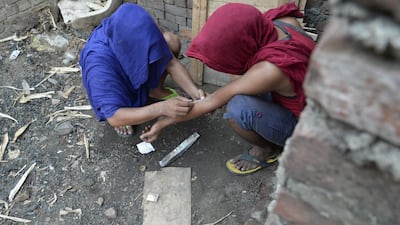GURDASPUR, INDIA // Opium addict Rajendar usually has to beg, steal or borrow to get his fix but at election season in India’s Punjab province, a packet is delivered to his home in a bid to win his vote.
“Like all addicts, I love elections and wish we had them every month,” said the 38-year-old farm labourer. “It’s the easiest time to get hold of what you need and everyone gets what they want. Normally we have to go out and find a dealer but at election time it gets delivered to your home for free.”
Rajendar, who is married with two children, is one of tens of thousands of addicts in Punjab who have earned the northern state an unwelcome reputation as India’s drugs capital.
While inducing voters with household appliances, alcohol or cash is widespread in some parts, electoral officials say candidates in Punjab try to woo addicts with free drugs.
Punjab is one of five states holding elections in the next few weeks, with the first round beginning on February 4.
Prime minister Narendra Modi and opposition leader Rahul Gandhi may try to sway voters with their power of their oratory at rallies, but in rural villages, votes are bought.
“In 2012, when we conducted the Punjab state elections, we suspected the use of drugs during polls ... and found drugs were in fact a very serious issue,” SY Quraishi, a former chief election commissioner said. “In one month alone, we recovered around 55 kilograms of heroin, around 430 kilograms of poppy husk (the raw ingredient of opium) and found almost every psychotropic substance in circulation.”
The results of a government-commissioned survey in 2015 estimated there could be as many as 320,000 “opioid dependent individuals” in Punjab, which has a population of 27 million.
Heroin was the most commonly-used drug, followed by opium which is legally grown in parts of India under government licence for medical use.
In the four weeks since the date of this year’s polls was announced at the beginning of January, the commission says more than 2.63 tonnes of drugs, including heroin and opium, have been seized.
That compares with a figure of 2.03 tonnes in Uttar Pradesh, which has a population of around 205 million and is also holding state elections.
Drugs have become a hot election issue, with opposition parties blaming the current state administration — an ally of Modi’s Bharatiya Janata Party — of turning a blind eye to the crisis.
Candidates promising new laws or heavier sentences for drug offences are cheered at rallies. But in the villages, campaigners offer the same drugs they pledge to eradicate.
Once the date for polling is set, election commission monitors make flying visits to localities to try to enforce a code of conduct. But before that, voters are up for grabs via more nefarious means, and it is then that the problem is particularly acute.
“There are people who want alcohol and then there are people who want opium or heroin or pills,” said Romesh Mahajan, project director of an addiction rehabilitation centre in Gurdaspur district.
Rajendar, who attends Mahajan’s clinic said addicts were more than happy to promise their vote to a particular candidate, regardless of policies.
“You never care about who’s going to win. As long as they give you your fix, you promise to vote for them. You make the same promise to whoever comes along,” he said. “We know we won’t see them after the elections, so you enjoy it while it lasts.”
Another addict called Indarjeet, who is trying to kick a heroin habit, said it was “very common” to be offered drugs in return for backing a candidate.
“When they get to the village they say ‘take whatever you want, as long as you vote for our guy’ and then they send someone back later, ” he said. “When you’re offered something for free then of course, you’ll take it. You don’t care about the election, only about feeding your habit.”
Police are carrying out spot checks on vehicles at election time to make sure they are not loaded with freebies, including cash, alcohol and drugs. Inspector general M F Farooqui of Punjab police said,
“We are committed to controlling this menace in this area and our officers our working tirelessly.”
* Agence France Presse

